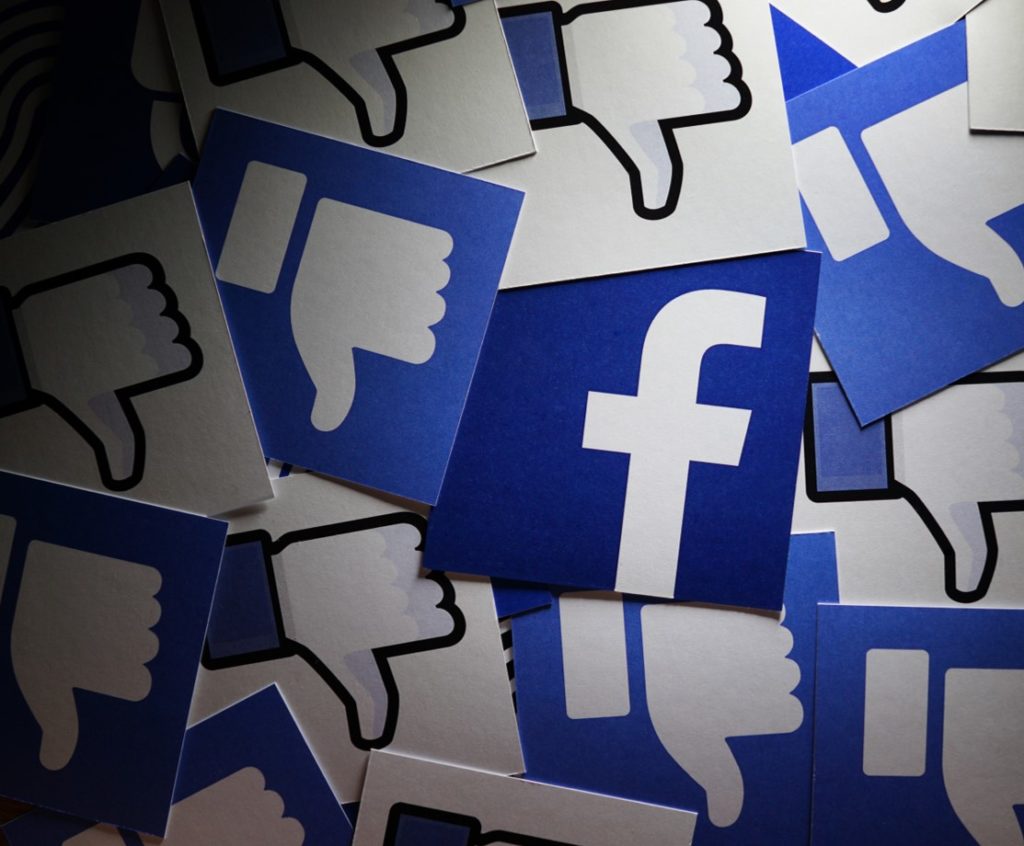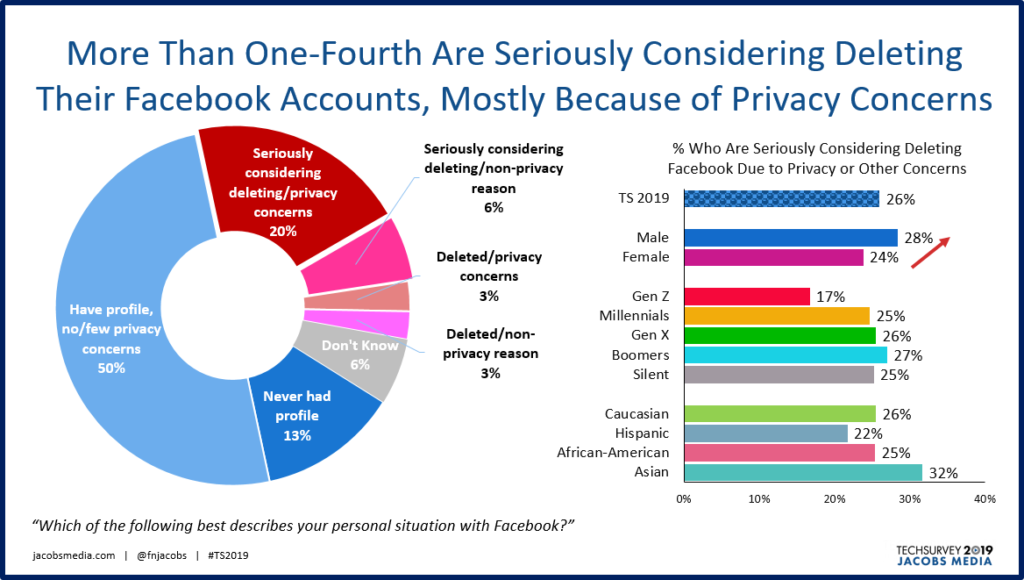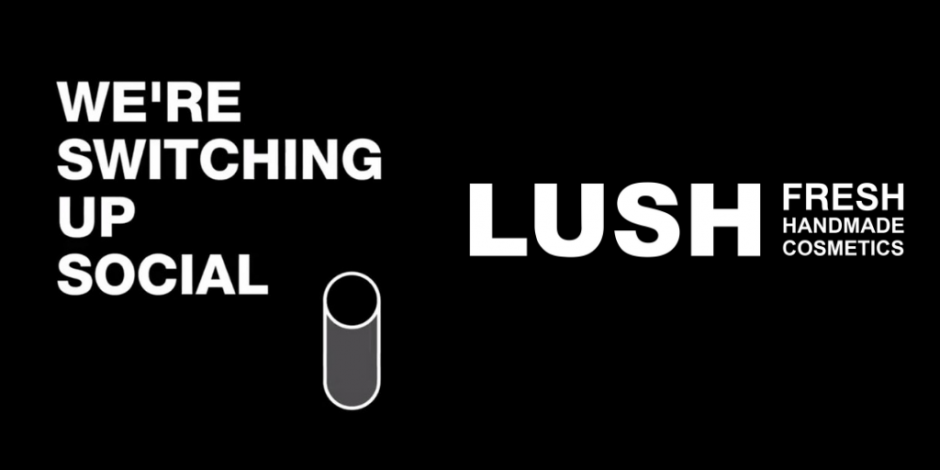
It hasn’t been an easy year for the corporate captains of social media. While all social platforms are under new pressure from legislators and their own members, the heat has been especially intense for Facebook. Data breaches, political manipulation, privacy concerns, and flat-out arrogance have all conspired to keep Mark Zuckerberg up at night.
We see the dips in Techsurvey. For the first time since we’ve measured social, Facebook’s “cume” – the percentage of our 50,000+ mega-sample with a profile on the platform – is ticking downward.
And we also included a question about whether Facebook users are contemplating dropping their accounts because of any number of concerns. A look at the results illustrates the precariousness of the platform’s user trust equation. Most of us never thought twice about going on Facebook, liking brands, or commenting on posts. But today, we know that data is being used by Facebook and its advertisers to profile its audience using AI and other tools.
So, has Facebook lost some of its luster among radio listeners?

Only half say it’s been business as usual on Facebook. Overall, 6% have already deleted their accounts, while a whopping one-fifth say they’re seriously considering bailing on Facebook due to concerns over privacy.
Note the demographics. Men are more concerned about these issues than are women. And while there is widespread generational concerns about privacy issues on Facebook, Gen Z or teens are less likely to be stirred by these breaches and lapses. Many of them believe they don’t have any online privacy, so why not continue on the way they have since mom and dad handed them their first tablet or smartphone?
But what about businesses and personality brands? How are they feeling about Facebook in 2019?
There are indications – still bubbling under – that many brand managers may now be reconsidering their social marketing connections on Facebook, as well as a number of other platforms in the space.
A new social cautionary tale revolves around Lush, the cosmetics company. As they’ve communicated to their customers – they’re shaking up their social presence in the UK.

That means Facebook, Twitter, and Instagram – sites where Lush has well over one million followers across the platforms.
Their reasoning? Here are key portions of their recent statement:
“Increasingly, social media is making it harder and harder for us to talk to each other directly. We are tired of fighting with algorithms, and we do not want to pay to appear in your newsfeed. So we’ve decided it’s time to bid farewell to some of our brand social channels – Lush UK, Lush Kitchen, Lush Times, Lush Life, Soapbox and Gorilla across Facebook, Twitter and Instagram – and open up the conversation between the Lush Community and us instead.
“Lush has always been made up of many voices, and it’s time for all of them to be heard. We don’t want to limit ourselves to holding conversations in one place, we want social to be placed back in the hands of our communities – from our founders to our friends.”
Rather than focus their connection efforts in the social space, Lush says it’s now going to focus on its own platforms – websites, email, and even the phone for fan conversations. They also emphasize the importance of connecting with Lush personalities online, a program that will incorporate influencers.
That distinction – concentrating on the outlets it owns rather than rents from Mark Zuckerberg and others is something we’ve talked about at Jacobs Media since Lori Lewis joined our company in 2013.

A story in The Drum by John McCarthy interviewed a number of marketers about Lush’s strategic decision. Most offered up criticism, noting what one called “the death of organic reach,” suggesting Lush should have stopped buying paid content long ago.
Others noted the ceding social media presence cuts off an important communications avenue especially in the case of a crisis. And by limiting fan communication, the ability to interact with customers without social is limited.
Lori Lewis weighed in as well, reminding us that “there’s so much more to social than ‘talking’ to customers. (Lush) must not understand the whole truth that when you’re not where the customers are, you give them permission to form loyalties elsewhere.”
But Lush isn’t the only one pushing back on their social presence. The enigmatic AOC – Alexandria Ocasio-Cortez – recently made this surprising revelation:
“I personally gave up on Facebook.”
Her campaign continues to manage her professional accounts, but the controversial freshman congresswoman – known for her social media savvy – has taken a very “anti-social” stance. For her to walk away from social media in her personal life is a decision worthy of our attention.
Forget how you feel about her – whether you’re a fan or a hater – and instead focus on her logic. AOC attributes her departure from Facebook to her belief that social media has become a negative in the lives of most of its users:
There are a growing number of people expressing these and other concerns about the impact, power, and unfortunate side-effects of social media.
So, are we watching a slo-mo video of Facebook (and other social platforms) jumping the shark?
Perhaps that’s a bit extreme, especially given their massive numbers, as well as the addictive qualities of these platforms. But all these indicators may be symptoms that consumers – and brands – are beginning to question their motivations, beliefs, and strategies in the social ecosphere.
Whether you’re a radio station, a personality, or even a fan looking for a more meaningful connection, social media is not the only way to make it happen. And this might be an early indicator that many are beginning to rethink some of the downsides of interacting in this space.
It will be fascinating to watch how Lush navigates a world of audience interaction sans social media in the UK. Their desire to connect with their fans on their owned assets is something that brands should be carefully watching. The critics are calling the decision wrong-headed, but you have to give them credit for seeking more meaningful, personal connections with their customers.
Is it possible to be social with fans without using social media?
We’re about to find out.
- What To Do If Your Radio Station Goes Through A Midlife Crisis - April 25, 2025
- A 2020 Lesson?It Could All Be Gone In A Flash - April 24, 2025
- How AI Can Give Radio Personalities More…PERSONALITY - April 23, 2025




I feel like this is true. I personally find nothing good going on or enough traction with Facebook. A lot of my interactions are done through Twitter for the real-time element of the podcast conversations. I’ve contemplated deleting my Facebook for years and rarely use it other than to check in with those who do use it that I’m friends with. I’ve gone as far as deleting various pages and groups I’ve joined or created in recent months.
I believe having everything in house on your station/podcast’s website is going to be the go-to in the coming months and years where you can control a good portion of the security and elements getting out there.
Steven, I like where you’re headed. I believe social media has a place in a station’s marketing architecture, but brands need to put it in perspective. For many radio stations, it’s been their only marketing outlet. That’s not healthy for many reasons, not the least of which is that we don’t control what Facebook, Twitter, Instragram and the others are doing with their platforms. Thanks for the thoughtful comment.
Facebook just reconnected me with my mentor from 1963 when I first got into recording in Detroit. The personal contact aspect is incredible. That said, I’ve never gotten any work as a result of my Facebook activity.
I agree that having everything in-house is the best way to go in the long run. I suspect the best opportunities are local now that everybody is focused on global.
Bob, I think it’s about understanding what Facebook can be – and what it shouldn’t be. For too many stations, it’s the ONLY thing they’re doing. Thanks for the comment.
I had Facebook for about five minutes, about ten years ago. I got rid of it because quite honestly it was annoying, with “reminders” and “notifications” and other crap I had no time for. Perhaps that makes me an “early UNadopter”?
I have kept my Twitter account all this time, but my feed is entirely news organizations, certain elected officials, and those friends who are politically active and/or news-savvy.
And, of course, I still have LinkedIn (as you already know, Fred).
I’m glad to see corporations pull back from their social media ties. I’ve lost count of the number of times I have contacted businesses charging them with discrimination for having promotions requiring a “like” on Facebook or a “tweet” of their product on Twitter. Maybe they’re finally realizing that their customers don’t want to be forced that way.
Of course, I find Mark Zuckerberg insufferable anyway.
It’s a really interesetiing point in time, KM. Social media assumptions are being questioned – and they should be. Thanks for connecting with us on an increasingly important topic.